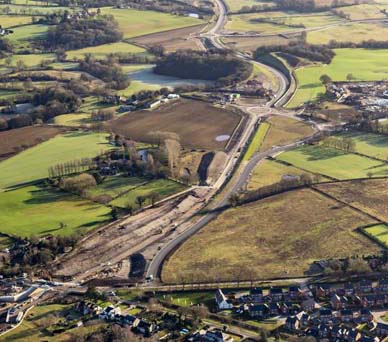The group raising money to erect a statue in honour of a famous suffragist received a boost this week with the news that Congleton Link Road will also honour the same woman.
The long-awaited opening date of the £90m Congleton Link Road has been revealed – along with its historic new name. The 5.5km route will open for the public to walk and cycle along on Friday, 16th April, and that weekend, before opening to vehicles for the first time on Monday, 19th April.
And the borough’s largest infrastructure project to date will be named Wolstenholme Elmy Way – after Congleton’s famous pioneering educationalist and campaigner for votes for women, Elizabeth Clarke Wolstenholme Elmy.
Susan Munro, chair of Elizabeth’s Group, which is raising money for the statue, said: “Elizabeth’s Group is absolutely delighted that Elizabeth is being honoured with the naming of the link road.
“For this to come in international women’s history month is very fitting.
“Elizabeth led the fight for equality for over 50 years with her tireless campaigns which culminated in so many freedoms for women today. It’s a great day for equality for all and for Congleton in particular.”
She added: “Let’s hope that a woman is given the honour of cutting the ribbon.”
The opening to traffic will be marked by a small covid-secure ribbon-cutting ceremony followed by local classic car enthusiasts driving their vehicles along the route.
The new road aims to relieve Congleton of some of its historical traffic problems, create road space for cyclists and pedestrians and improve air quality for residents, while opening up new development opportunities for employment and housing.
Despite the twin challenges of the covid pandemic and recent severe winter weather, the council’s contractor, Graham, worked to reduce the delays to the project, which was originally due to open late last year. The scheme will still be delivered within budget.
The new highway joins the A534 Sandbach Road to the west and the A536 Macclesfield Road to the north, opening up connectivity and improving travel between Macclesfield, Congleton and the M6.
It will release 20 hectares of new employment land with the potential to create 3,000 jobs by 2035.
Sandbach’s Coun Laura Crane, Cheshire East Council Cabinet member for highways, said: “I know Congleton Town Council and the people of Congleton have been very supportive of this scheme and I am delighted that everyone’s hard work is coming to final fruition.
“I want to thank Graham for ensuring that work could continue in a safe manner during this difficult year. Seeing this road named after a local suffragist is a wonderfully positive statement for the community as we move forward.”
Alastair Lewis, contracts manager for Graham, said: “This is a fantastic moment for the whole construction team, its partners and the local community. Despite the impact of the pandemic and some tough recent winter weather, we have been able to continue our works in a safe manner, while following Government and public health guidelines, and have delivered the link road as close to the original schedule as possible – and within budget.”
Cheshire East Council is contributing £24m towards the scheme with central government and developer contributions meeting the balance.
Elizabeth Wolstenholme Elmy (1833–1918), who lived in Congleton from 1874 until her death, campaigned for girls to be given the same access to higher education as boys and for women to be given the vote. She also campaigned on women’s health rights, including an Act that required women suspected of being prostitutes to undergo compulsory medical examination but not men.
Mrs Wolstenholme Elmy founded the Manchester Schoolmistresses Association in 1865 and the Manchester Committee for the Enfranchisement of Women in 1866 and began 50 years of vigorous campaigning for women’s suffrage.
She gave up her school role in 1871 and became the first paid employee of the women’s movement, when she was employed to lobby Parliament with regard to “laws that were injurious to women”.
Nicknamed “the scourge of the commons”, she was instrumental in maintaining the movement’s momentum with a re-grouping in 1867 under the name Manchester Society for Women’s Suffrage.
In 1877, the women’s suffrage campaign was centralised as the National Society for Women’s Suffrage. Mrs Wolstenholme Elmy was a founding member of the Women’s Franchise League in 1889. She left the organisation and founded the Women’s Emancipation Union in 1891, a forerunner of the more militant Women’s Social and Political Union, known as the suffragettes. Women eventually got the vote in 1918.
A blue Congleton Civic Society plaque can be seen today at Mrs Wolstenholme Elmy’s former home, Buxton House, Buglawton.
• To support Elizabeth’s Group’s statue fund, visit elizabethelmy.com or find @elizabethsgroup on Facebook.
















Will this new road really take traffic away from Congleton surely it needed to link to the A34 before Astbury